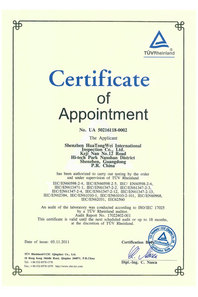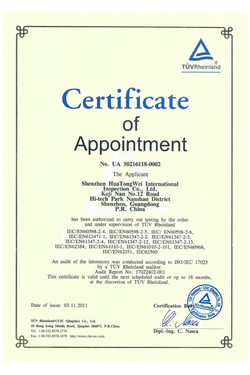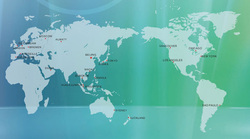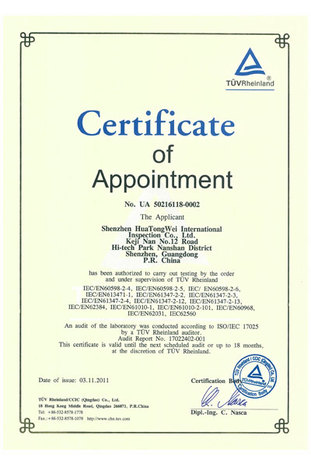 For the blind pursuit of profit, some food manufacturers use food additives in a high dose which impact on people's living quality. This bad social phenomenon results in people's misunderstanding for food additives that the public has been afraid of it. In fact, food additives are not equal to illegal additives. The excess of food additives by some illegal manufacturers will harm the human body, and third party verification is necessary here in order to create a comfortable and health living environment for people. People should also strengthen self-protection awareness, learn more about food safety, not buy the food products with too brilliant color, heavy flavor and unusual taste.
There are 23 kinds of food additives and more than two thousand varieties inspected from global inspection services, including acidity regulator, anti-caking agents, antioxidants, leavening agents, colorants, enzymes, flavor enhancers, nutrition enhancer, preservatives, sweeteners, thickeners, spices, etc. Codex Committee on Food Hygiene defines the food additive as a kind of non-nutritive substances which can only add a little in food products to improve food appearance, flavor, organizational structures and storage properties.
Actually, food additives, known as the soul of the modern food industry, contribute greatly to the development. For example, the preservative can prevent food spoilage caused by microorganisms, and extend the shelf life of food; it also has the function of preventing food poisoning caused by microbial contamination. What more, during the food processing, appropriate addition of food enrichment which belongs to the natural nutrition, can greatly improve the nutritional value of food, and it is conductive to prevent nutritional deficiencies and promote nutritional balance.
The safe use of food additives is very important. Its toxicity is the ability to cause damage to the body, and besides the relationship with its chemical and physical properties, toxicity is also related with effective concentration, route of exposure and other conditions. Thus, only when the dose of food additives is up to a certain level, the toxic effects will set in action.
 We are using a variety of cosmetics every day, and no matter which kind of cosmetics, are constituted by many harsh chemicals, some of the components have direct irritation to the skin, which will possibly result in skin sensitivity, pigmentation, acne and ever worse, cancer. So we must have a clear awareness and choose the products manufactured by qualified companies. Sometimes, inspection services by authoritative third party service provider are necessary.
1. Ethanol
Ethanol has two fatal weaknesses and because of which, large-scale and long-term use of some cosmetics is unfavorable. One defect is its high volatility. And in the process of volatility, moisture will be taken away from our skin. Another defect is the strong decomposition. When the facial oil is decomposed, the protection film on skin surface will be damaged; as a result, our skin will become sensitive and fragile. So using skin care products which contain ethanol in the dry season require our attention.
2. Salicylic acid (BHN)
Initial use of products containing salicylic acid, skin is felt like a boiled egg, soft and slippery. In fact, the reason is very simple, salicylic acid plays a role in cleaning aging skin. However, keratinocytes updated every 28 days, excessive elimination of stratum corneum will undermine the protective layer of skin, and cause erythema, itching, tingling or hypersensitivity. So the use of salicylic acid need to be careful, it is best to avoid direct contact with eyes, face and mucous membranes.
3. Tartaric acid (AHA)
AHA acid, by making your skin thinning, increases the whitening and exfoliating effect. Although the effect is obvious and immediate, you will soon find your skin become sensitive, even worse, when taking a serious look at cheeks, capillaries can also be seen under the skin. And AHA has a strong photonasty and your skin will be suntanned if using the skin care product in the morning.
4. Lead and its compounds
Lead and its compounds are often added into hair dye. In accordance with state regulations, the content of lead in hair dye products must be less than 0.6% (Pb meter), otherwise it will have side effects and release toxins. By absorbing through the skin, lead and its compounds may be hazardous to human health, particularly affecting the hematopoietic system, nervous system and kidneys.
5. Cadmium and its compounds
In cosmetics products, the content of cadmium and its compounds must not exceed 40mg/kg. The toxicity of cadmium is small, but cadmium compounds are highly toxic, especially the cadmium oxide. Damages from cadmium and its compounds are primarily to heart, liver, kidney, skeletal muscle and bone tissue.
Broadly speaking, quality inspection covers almost everything in people's life; To be specific, the coating which used to paint walls and furniture should be inspected to see whether it contains excess harmful chemical compositions before being sold in the market; jam should be inspected that whether the additives are non-edible before being spreaded on bread. And in this case, third party verification is more authoritative
and impartial. Because there have always been some tricky marketers who cheat consumers with false information, and due to lack of expertise in a certain profession and specific instruments, consumers are often at a disadvantage.
Quality inspection mainly plays four roles in the society:
1. Evaluation Function
Inspections will be made in accordance with relevant regulations and technical standards, and the test results will be compared with the standard information, then the judgment will be made that whether the product is qualified or not. Inspection can evaluate the level of product quality in order to give guidance to the production, commodity exchange and economic activity.
2. Guard Function
By issuing product qualification certificates to qualified products' manufacturers, the quality of raw materials, semi-finished products and finished products is also assured.
3. Prevention Function
With the inspections for raw material, semi-finished product and finished product from sampling inspection, early detection to the exclusion of inferior-quality products, the final decision will be made whether this series of products are substandard or qualified to go into the next process, which avoid manufacturers' greater losses. Meanwhile, quality inspection can provide the basis for the quality control. Timely detection of quality problems can reduce the quantity of defective products in the society, and prevent the accident due to poor quality of a large number of products from happening.
4. Feedback Function
Records, statistics, analysis and evaluation of the products' information and timely feedback to the managers and other functional departments, are conductive for companies to take appropriate measures to improve product quality.
 Every product that is being exported to any place across the globe needs to be sampled, analyzed and certified for quality and standard to bring in clarity and transparency in the international trade market. Therefore, Final Random Inspection is needed. Some countries opt for certain forms of certifications on the products that will assure the quality and correctness to the dealers to whom the commodities are being exported. If you have goods that need to be completed by a certain date or want Third Party Inspection to eliminate all the areas of defects these agencies will help you efficiently. These Third party agencies along with their team of qualified and experienced professional inspectors and engineers who are proficient in both national and international standards will carry out productive inspections and audits to ensure you with a timely and hassle free production delivery.
No matter what the specific industry, quality control is mandatory for any business that produces a good, whether it is for wholesale or retail distribution. From pharmaceuticals to aerospace products to children's toys, quality products ensure happy customer. The term quality management has a specific meaning within many business sectors. This specific definition, which does not aim to assure "good quality" by the more general definition, but rather to ensure that an organization or product is consistent, can be considered to have four main components: quality planning, quality control, quality assurance and quality improvement. China quality control is focused not only on product/service quality, but also the means to achieve it. Quality management therefore uses quality assurance and control of processes as well as products to achieve more consistent quality.
The International Standard for Quality management (ISO 9001:2008) adopts a number of management principles that can be used by top management to guide their organizations towards improved performance. The principles include: Customer focus, Leadership, Involvement of people, Process approach, System approach to management, Continual improvement, Factual approach to decision making and Mutually beneficial supplier relationships.
China Certification & Inspection Group Shenzhen Co., Ltd (hereinafter referred to as CCICSZ) is a core subsidiary company of China Certification & Inspection Group (hereinafter referred to as CCIC) with independent corporation qualification. Based in Shenzhen, the Company provides specialized and prompt inspection, certification, surveying, testing and training services to broad customers both at home and abroad.
This article comes from:http://www.ccic-shenzhen.com/News/32.htm
 When you buy something, there is no doubt that you will focus on its quality and function. If there is no guarantee that the product you buy is qualified, I bet you won't consider purchasing it. Since we mention the quality of the goods, the institute of quality inspection should be known. The third party inspection (TPI) is inspection carried by the independent third party (such as a full-time supervision and inspection agencies) who is out of the trading interests. This party is fair and authoritative non-identity of the two parties. It inspects according to relevant laws, standards, contracts accepted by both sides basis for product compliance testing and accreditation activities. Third party inspection activities are relatively concentrated in industrial activities, particularly in the industrial manufacturing industry.
The third party inspection market is well developed in the West. The third party inspection companies have had to bear an important role from a small indoor air quality to people's families, and to large major engineering standard. If a company's products obtain a certificate of competency issued by the third-party inspection company or certified out of trouble, these third-party companies that issue a qualified report and certification will be closed, or is responsible directly to jail. Several years ago, once a famous American third-party testing organization is seized in an accident, the next branch offices in all 50 states are all closed. Because of serious consequences supervision, it has been declared independent of A and B both third-party quality inspection agency will not dare to issue a qualified report and issuing various certificates. After issuing a qualified report and certification to the applicant, as the issuing agency, a third party needs to continue to follow to ensure that their own inspection of the product will not be a problem.
CCIC will make constant efforts to expand its business scope, improve its service quality, and promote China inspection and CQC as trustworthy brands to meet the needs of its clients. With its international operation experience, cutting-edge technologies and global business network, CCIC provides clients worldwide with impartial, efficient, reliable, standardized and localized services.www.ccic-shenzhen.com is an independent third party certification and inspection organization dedicated to providing inspection, verification, certification and testing services, with accreditation by General Administration of Quality Supervision, Inspection and Quarantine of the People's Republic of China(AQSIQ), Certification and Accreditation Administration of the People's Republic of China(CNCA) and China National Accreditation Service for Conformity Assessment(CNAS).
 Nowadays, there are many training courses for people to choose and learn. If you want to take a course to learn something about inspection but have no idea to choose which company to apply courses, I suggest you go to China inspection.
CCIC and CQC integrated to create the most authoritative organization of certification and training. CCIC under CQC is approved by CNCA, and confirmed by CCAA as a professional training institution. It possesses the qualification of multi-system certification training and product certification training. Operating in accordance with international standards and norms, CCIC and CQC provide high-quality training services to community with professional teachers, advanced teaching methods and standardized management.
The training courses that the CCIC inspectionoffers mainly including four: management skill training, series of quality management training, seminar on the latest standard and auditor training.
The Management skills training
Purchase management training, Material management training, Production plan management training, Total quantity management training(TQM), 6 sigma basic knowledge training, Business Process Redesign (BPR), 5S promoting training, Total Productive Maintenance training(TPM), Management awareness and practice management, Business operation and management.
Series of quality management training
Application of quality management practices in the service industry, Application of quality management practices in local governments, Performance improvement in quality audits, Case experience: Application of quality management in management practices, quality cost management and control, personnel training for quality improvement, Seven Tools of quality management.
Seminar on the latest standard
European Union's RoHS Directives, European Union's Reach Directives etc.
Auditor Training
QMS, EMS, OHSMS18000, HACCP, 17020 internal or external auditors training, SA8000
CCIC is one of the only two training companies for auditor and internal auditor in ISO9001 QMS, ISO14001 EMS, GB/T28001 OHSAS, HACCP under accreditation by CNAT in China. CCIC has a team of professionals with both theoretical knowledge and rich experience in audit. There are more than 20 teachers of ISO9001, ISO14001, OHSMS18001, ISO22000 approved by CCAA and about a hundred teachers of quality management, internal auditors of management system, providing adequate human resources for the extensive training work. CCIC will offer the audit chance to whom joined the training and passed the exam in CCICSZ, and it will help you to be auditor or senior auditor.
 To ensure consistency and service excellence, all field and laboratory staff have gone through an intensive 2-3 months in-house training and examination process before they are qualified as independent technical inspectors, auditors or testing engineer/technician. China inspection believes a rigorous and well-established training program is essential to provide world-class consistency in service delivery for Clients. Committed resources, training plans and comprehensive materials allow us to offer condensed and intensive training to qualify employees; dedicated trainers by service and product category ensure employees receive the specialized training required to perform their duties; customized equipment and product sample rooms provide hands-on learning and simulate infield experience; in-depth training on procedures, including case studies and reporting requirements to create globally consistent results and reports for clients. CCIC operates a wide network of over 300 offices and laboratories which are located in major ports and cargo distribution centers around the world. With over 20 years' experience in the inspection and certification field, ccic inspection</a> has established cooperation relationships with more than 120 inspections and certification companies in over 60 countries and regions. CCIC-SZ has a wide pool of industry-specific inspectors located in strategic locations across China, such as Guangdong, Fujian, Zhejiang, Ningbo, Jiangsu, Shanghai, Tianjin, etc., but unlimited to the above places. At CCIC Inspection and ethics is our number one core value-fixed and absolute-never to be compromised. Our continuous compliances are supported by a Code of Ethics. Specifically our CCIC Inspection Integrity Program covers: Code of ethics training, Employee ethics agreements, Code of conduct letter for factory, Formal complaint and claim investigation procedures etc. Chine Certification & Inspection Group (CCIC) is the first independent organization to provide inspection, verification, certification and testing services for import and export goods in China. Its history can be traced back to 1980, when China National Import and Export Commodities Inspection Corporation was founded. Its forerunners also include the China Commission for Conformity Certification of Electrical Equipment (founded in 1984), Safety and Quality Licensing System Office of Import Commodities of the State Administration of Import and Export Commodities Inspection (founded in 1989). This article comes from:http://www.ccic-shenzhen.com/News/28.htm
 Our company wants to set up a branch company in China in order to expand the market. Although all our products are food with high quality, we still want to give customers ratification by passing several tests of an expert trustworthy Inspection company. We don’t know which inspection company is better so find one representative company to inquire-CCIC Inspection.
According to the relevant provisions of Ministry of Health of People's Republic of China and General Administration of Quality Supervision, Inspection and Quarantine of People's Republic of China, all imported foods, special dietary uses foods, health-care food products, and cosmetics must be in line with China's relevant laws and regulations. Those products which are affirmed to tally with the correlative codices and statutes should be allowed to sale. The main codices include five aspects: Food imports, Special Dietary Uses food imports, Health-care Food, Cosmetics, and Detection.
China quality control has professional knowledge and experience regarding food and cosmetics, and sufficient registered qualities.
First, Label-records Agency: Acting for the application and record for imported food, cosmetics labels; providing customers with full follow-up services;
Second, Special Certification for Special Dietary Uses Foods: Agent acting for the application for import-food-labeling and pre-proof certifications for Special Dietary Uses foods, and getting the pre-proof certifications;
Third, Design Product Safety Testing: According to the food, cosmetics original packaging and related regulatory requirements, providing test programs and being projects' submit agent;
Fourth, Testing Agency: Agent acting for clients to send samples to CIQ-designated-laboratory for detecting, and get the testing report.
When we asked what the advantage of implementing HACCP is, the company consultant told us that the biggest advantage of HACCP lies in that it is a quality guarantee method of putting prevention first, and is provided with strong systematic characteristic, rigorous structure, strong applicability and remarkable benefit. It is an active control since the correction measure is adopted before the problems come forth. It is controlled according to the characteristic that is easy to be supervised, such as time, temperature and appearance. The supervision method is simple, audio-visual, fast, and is of strong maneuverability. Establishment and effective operation of HACCP indicate the organization attaches great importance to food security and sanitation, and has adopted positive and effective control method.
It is applied to all the organizations that look forward to establishing and implementing effective food safety management system certification in food chain, regardless of its style, scale and supplied products. It includes the organizations which are directly involved in one or several links of food chain (For instance, it is not limited to feed processor, crop planter, supplement producer, food producer, tradesman, food service business, mixed-meal service, and the organizations that provide the service of cleaning, transportation, storage and retail), and the organizations which are indirectly involved in the food chain (for example, the supplier of equipment, cleanser, packing material and other materials contacting with food).
This article comes from:http://www.ccic-shenzhen.com/News/27.htm
 There are several types of inspection, the following passages will introduce you some of them.
Full Checking Inspection
All shipment products inspection according to international quality standard by experience inspector to control the whole lots quality usually for your special/expensive/high risk product. The 100% trust for product.
Sample Picking (Collected Samples for client or lab test)
Random selected samples by inspectors from the bulk lots or specifically selected samples according to clients are used for lab testing, case study, complaint solution or promotion and so on.
IPI (Initial Production Inspection):
IPI focuses mainly on the quality of the components and materials used in the production process. It includes a visual check on the quality of packing materials and accessories. IPI permits timely corrections and improvement before mass production is initiated.
Factory Audit:
The audit by the second party normally includes: System, Factory Evaluation Certificate Audit
First, planning and implementation extent of the supplier's quality system; Second, the product quality and stability; Third, supplier's process capability on the production line, including key process parameters, equipment, tooling ability and their conformity to the requirements; Fourth, audit of the overall process or partial process from procurement, logistics, production plan, production implementation, inspection, packing, warehousing to product delivery; Fifth, the extent that the supplier executes the engineering and management requirements of the clients.
DPI (During Production Inspection):
The production is inspected by third party inspection when 40- 60% of the order has been completed so as to ensure that contractual obligations regarding specifications, packaging, marking are met. DPI is ideal for shipments of substantial quantities, product lines with continuous production and on-time shipments with strict requirements. And it’s a follow-up if poor results were found during IPI. DPI makes it possible to provide recommendations on site, so that the quality is maintained throughout the entire production phase.
FRI (Final Random Inspection):
FRI is an evaluation of key products at the end of production, when a consignment is 100% manufactured and at least 80% packed. It is commonly used to safeguard the shipment according to the statistical random-sampling standard ANSI/ASQC2 1.4C MIL.STD-105E is generally conducted on the premises of the manufacturer on samples selected according to defined sampling procedures. We will inspect the products final quality, quantity, packing. During quality check stage, we will check the marking, packing, appearance, workmanship, functionality and etc.
Loading Supervision:
The purpose of Loading Inspection is to ensure your goods are loaded in a proper manner; containers used are good and relatively clean. Loading Supervision is carried out in the manufacturer's warehouse or at the forwarder's premises. During Loading Supervision, a CCIC representative will closely monitor the loading process, verify product quantity, and ensure appropriate handling of the cargo. Upon completion the container(s) will be sealed with CCIC tape as proof of compliance.
CCIC,china inspection, will make constant efforts to expand its business scope, improve its service quality, and promote CCIC and CQC as trustworthy brands to meet the needs of its clients. With its international operation experience, cutting-edge technologies and global business network, CCIC provides clients worldwide with impartial, efficient, reliable, standardized and localized services.
This article comes from:http://www.ccic-shenzhen.com/News/26.htm
 After import and export commodity are inspected by China Inspection, the qualified products will be issued the proof called "commodity inspection certificate." In addition, if the buyer and seller in the transaction agreed upon by the production unit or use the unit issue as an inspection certificate, the proof of inspection certificate may also play a role.
In international trade, set up by the state inspection agency or by a government-registered, independent, third party accreditation bodies-CCIC inspection. It supervise the quality of import and export goods, and other aspects of goods such as specifications, health, safety, quarantine, packing, quantity, weight.Shipping technology conducted the inspection, appraisal and supervision work. Transfer of goods import and export commodity inspection process is an indispensable link. Passed the test, and issue inspection certificate, the exporter can be shipped declaration; unqualified, may apply for a re-inspection, re-inspection is still unsatisfactory, and may not be exported.
Inspection Certificate (Inspection certificate) is the import and export commodity inspection company implements the inspection or other evidences after identification. In the specific business, the seller needs to provide exactly what the certificate, according to the type of goods, nature, trade practices and government laws and regulations may be.
The main function of commodity inspection certificate as follows:
First, as the basis for transfer of goods between buyers and sellers.
Second, as the basis for claims and adjustments.
Third, as a basis for settlement payment between buyers and sellers.
Fourth, inspection certificate can be used as customs clearance customs examination certificate.
Types of commodity inspection certificates:
First, quality inspection certificates, merchandise exports and imports of goods delivery settlement settlement claims valid certificate; statutory certificate of inspection of goods, import and export goods declaration, Output Input legitimate credentials.
Second, weight or quantity inspection certificate is to export delivery settlement, issuing bills of lading and import commodities settlement claims valid certificate; export certificate of weight, but also the foreign tax declaration and calculation of freight, handling costs documents.
Third, health inspection certificate is proof of export for human consumption of animal products, food hygiene inspection or quarantine through documents. For sausage, canned, frozen fish, eggs, dairy products, honey, etc. In foreign delivery, bank settlement, and customs clearance of valid documents.
China Certification & Inspection Group Shenzhen Co., Ltd (hereinafter referred to as CCICSZ) is a core subsidiary company of China Certification & Inspection Group ((hereinafter referred to as CCIC) with independent corporation qualification. Based in Shenzhen, the Company provides specialized and prompt inspection, certification, surveying, testing and training services to broad customers both at home and abroad.
This article comes from:http://www.ccic-shenzhen.com/News/25.htm
|










 RSS Feed
RSS Feed